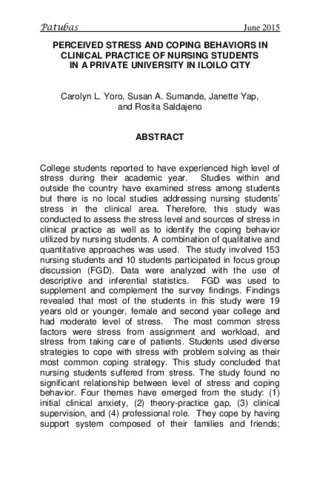Perceived stress and coping behaviors in clinical practice of nursing students’ in a private university in Iloilo City
| dc.contributor.author | Yoro, Carolyn L. | |
| dc.contributor.author | Sumande, Susan A. | |
| dc.contributor.author | Yap, Janette E. | |
| dc.contributor.author | Saldajeno, Rosita | |
| dc.coverage.spatial | Iloilo | en_US |
| dc.date.accessioned | 2021-08-06T06:09:25Z | |
| dc.date.available | 2021-08-06T06:09:25Z | |
| dc.date.issued | 2015-06 | |
| dc.identifier.citation | Yoro, C. L. , Sumande, S. A. , Yap, J. E. & Saldajeno, R. (2015). Perceived stress and coping behaviors in clinical practice of nursing students’ in a private university in Iloilo City. Patubas, 10(1), 121-137. | en_US |
| dc.identifier.issn | 1908-515X | |
| dc.identifier.uri | https://hdl.handle.net/20.500.12852/1299 | |
| dc.description | Journal article | en_US |
| dc.description.abstract | College students reported to have experienced high level of stress during their academic year. Studies within and outside the country have examined stress among students but there is no local studies addressing nursing students’ stress in the clinical area. Therefore, this study was conducted to assess the stress level and sources of stress in clinical practice as well as to identify the coping behavior utilized by nursing students. A combination of qualitative and quantitative approaches was used. The study involved 153 nursing students and 10 students participated in focus group discussion (FGD). Data were analyzed with the use of descriptive and inferential statistics. FGD was used to supplement and complement the survey findings. Findings revealed that most of the students in this study were 19 years old or younger, female and second year college and had moderate level of stress. The most common stress factors were stress from assignment and workload, and stress from taking care of patients. Students used diverse strategies to cope with stress with problem solving as their most common coping strategy. This study concluded that nursing students suffered from stress. The study found no significant relationship between level of stress and coping behavior. Four themes have emerged from the study: (1) initial clinical anxiety, (2) theory-practice gap, (3) clinical supervision, and (4) professional role. They cope by having support system composed of their families and friends; prayers; avoidance and escape the situations, diversional activities and self-control. A comprehensive program for students should be developed to reduce stress and to utilize healthy coping strategies to enhance health promotion. | en_US |
| dc.language.iso | en | en_US |
| dc.publisher | Central Philippine University | en_US |
| dc.subject.lcsh | Stress (Psychology) | en_US |
| dc.subject.lcsh | Stress management | en_US |
| dc.subject.lcsh | Nursing students | en_US |
| dc.subject.lcsh | Nursing--Practice | en_US |
| dc.subject.lcsh | Life skills | en_US |
| dc.subject.lcsh | Coping | en_US |
| dc.subject.lcsh | Nursing students--Academic workload | en_US |
| dc.subject.lcsh | College students | en_US |
| dc.subject.lcsh | Philippines--Iloilo | en_US |
| dc.subject.mesh | Stress, Psychological | en_US |
| dc.subject.mesh | Students, Nursing | en_US |
| dc.title | Perceived stress and coping behaviors in clinical practice of nursing students’ in a private university in Iloilo City | en_US |
| dc.type | Article | en_US |
| dc.citation.firstpage | 121 | en_US |
| dc.citation.lastpage | 137 | en_US |
| dc.citation.journaltitle | Patubas | en_US |
| dc.citation.volume | 10 | en_US |
| dc.citation.issue | 1 | en_US |
이 항목의 파일
This item appears in the following Collection(s)
-
Patubas [110]
Patubas is a refereed research journal of Central Philippine University.


